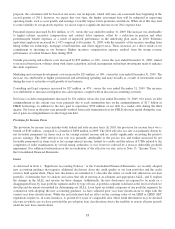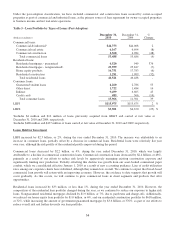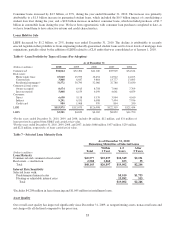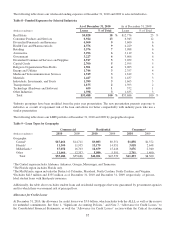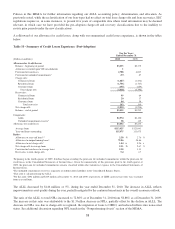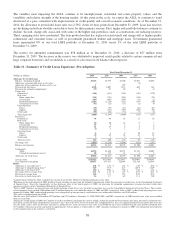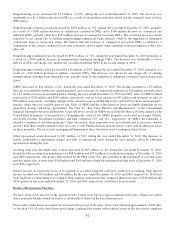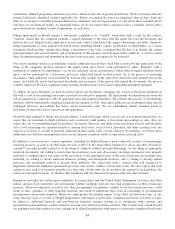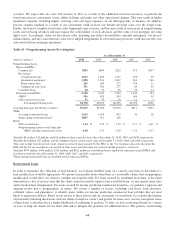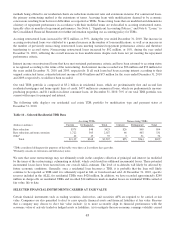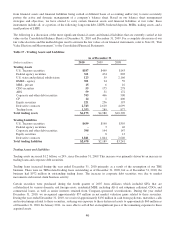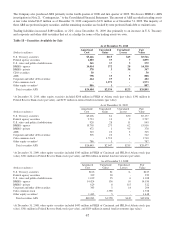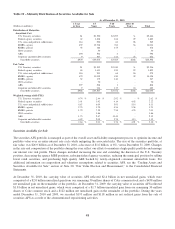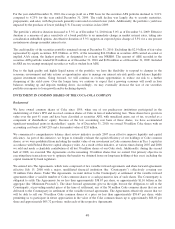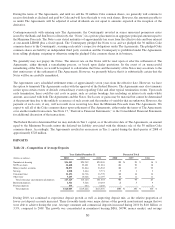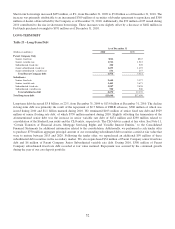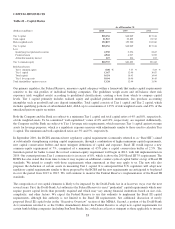SunTrust 2010 Annual Report Download - page 59
Download and view the complete annual report
Please find page 59 of the 2010 SunTrust annual report below. You can navigate through the pages in the report by either clicking on the pages listed below, or by using the keyword search tool below to find specific information within the annual report.verification, affidavit preparation and notary processes, which we describe in greater detail below. We do not believe that any
potential deficiency identified violated applicable law. Below, we explain the issues we identified, what we have done and
what we are doing to remediate potential deficiencies identified, and our expectations as to the effect these remedial efforts
will have on our financial results. As explained below, we do not expect these concerns to have a material adverse affect
upon our financial condition, results of operations, or cash flows.
Filing requirements in Florida require a foreclosure complaint to be “verified” when filed with a court. In this context,
“verified” means that the complaint includes a signed statement to the effect that the signer has read the document and
believes the facts alleged in the complaint to be true and correct to the best of the signer’s knowledge and belief. Similarly,
filing requirements in some judicial foreclosure states, including Florida, require an affidavit of indebtedness, or a sworn
statement, which includes, among other things, a description of the loan, a statement that the loan is in default, the current
principal balance and accrued interest, and an itemization of the amounts owed. In many states, affidavits, as well as certain
other documents prepared and submitted in the foreclosure processes, are required to be notarized.
Our review identified instances in which the verified complaints may not have been fully reviewed by the signer prior to the
filing of the complaint. In those instances, the signer relied upon review work performed by others. Similarly, with a
population of affidavits of indebtedness, our review indicated certain circumstances where officers signed affidavits based
upon a review performed by a foreclosure processor, rather than based on their review. As to the process of notarizing
documents, while signatures were notarized by notaries who worked on the same floor and in the same general area as the
signer, and while the notary had personal knowledge and awareness of the person who signed the documents, the process
could be improved. We have completed notary training and the process is now more regimented and tightly managed.
To address all issues identified, we have elected to replace any documents containing one or more of the issues identified on
file with a court in any pending foreclosure action not yet reduced to judgment. All replacement documentation has been and
will be prepared in compliance with all applicable rules and required formalities. We estimate this process of resubmitting
affidavits will be substantially completed during the first quarter of 2011. Once these affidavits are resubmitted, there may be
prolonged adversary proceedings that delay certain foreclosure sales. We are undertaking similar remedial action in
non-judicial foreclosure states as necessary and appropriate.
Given the time required to bring a foreclosure filing to a judicial hearing, which exceeds one year in many jurisdictions, we
expect that our remediation efforts will delay only a relatively small number of foreclosure proceedings or sales. Also, we
expect the cost of resubmitting legal documents to be modest. However, any delay in the foreclosure process will adversely
affect us by increasing our expenses related to carrying such assets, such as taxes, insurance, and other carrying costs, and
exposes us to losses as a result of potential additional declines in the value of such collateral. Nevertheless, we believe these
additional costs will have an immaterial effect on our financial condition, results of operations, and cash flows.
In addition to our own review, various regulators, including the Federal Reserve, have conducted a review of our mortgage
servicing practices, as well as all other large servicers in the U.S. We expect these regulators to ask us and other servicers to
consent to an order possibly related to (i) the filing of affidavits without personal knowledge, (ii) the filing of improperly
notarized documents, (iii) failing to ensure that the promissory note and all necessary mortgage documents were properly
endorsed or assigned and, if necessary, in the possession of the appropriate party at the time foreclosure proceedings were
instituted, (iv) failing to devote sufficient financial, staffing, and managerial resources, and (v) failing to develop related
processes and operational controls to prevent these problems. We expect that such a consent order will require us to
implement substantial additional operational processes and reviews within a certain time frame. We also expect that such
regulators may seek civil monetary penalties at a later time. At this time, we do not know the amount of such penalties, the
extent of such required actions, or whether other regulators and law enforcement agencies will seek other remedies.
Regulators and other law enforcement authorities in certain states and the United States Department of Justice and other
federal agencies have stated they are investigating whether mortgage servicers have had irregularities in their foreclosure
practices. Those investigations, as well as any other governmental or regulatory scrutiny of our foreclosure processes, could
result in fines, penalties or other equitable remedies and result in significant legal costs in responding to governmental
investigations and possible litigation. While we cannot predict the ultimate impact of any delay in foreclosure sales, or any
issues that may arise as a result of alleged irregularities with respect to previously completed foreclosure activities, we may
be subject to additional borrower and non-borrower litigation, investor scrutiny as to compliance with contracts, and
governmental and regulatory scrutiny related to our past and current foreclosure activities. This scrutiny may extend beyond
our pending foreclosure matters to issues arising out of alleged irregularities with respect to previously completed foreclosure
43


